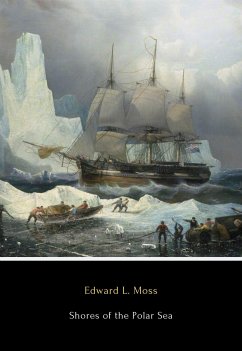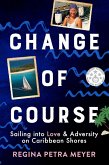When the British Arctic Expedition set sail from Portsmouth on May 29, 1875, the explorers hoped to reach the highest latitude, and perhaps even approach the ever-elusive North Pole. It was believed that, should they successfully pass through Smith Sound, between Greenland and Canada's Ellesmere Island, they would encounter an Open Polar Sea free from troublesome ice. With this primary goal, three steamships set out across the stormy Atlantic only to immediately become separated by a violent cyclone, reconvening at Disko Bay on the western coast of Greenland some weeks later. Perhaps they could have interpreted this early inconvenience as a sign of the winter to come, or a warning that the Arctic waters are rarely kind. Regardless, the captains pressed on.
In Shores of the Polar Sea, Edward L. Moss, an artist and esteemed Royal Navy Surgeon, records this journey from his first-hand seat in the belly of HMS Alert.
Overall, the expedition was a near disaster. The men suffered badly from scurvy and were hampered by inappropriate clothing and equipment. Realizing that his men could not survive another winter in the ice, Nares hastily retreated southward with both his ships in the summer of 1876.
In hopes of expanding England's contribution to natural history, they captured, bottled, and preserved everything from brittle feather stars to small black spiders. And what they didn't capture for study, they killed en masse to consume. Carrying Winchester repeating rifles — "murderous weapons for this sort of work" — the men hunted everything that moved. Arctic hares, reindeer, walruses, and seals, which they grimly nicknamed "floe-rats." As the winter encroached, so did a seemingly permanent darkness. Fearful of the perennial ice floes, which could easily crush whatever ship crossed their path, the Alert landed at Floeberg Beach, where it would rest until the following summer allowed for safe escape. And while the daily life of a sailor may appear unsympathetic, Moss's prose is deeply personal, poetic, and even romantic. Not only are his accounts of the expedition unflinchingly thorough, but they also linger playfully on every odd moment, awkward bit of dialogue, or alienating aspect of harsh Arctic life.
In Shores of the Polar Sea, Edward L. Moss, an artist and esteemed Royal Navy Surgeon, records this journey from his first-hand seat in the belly of HMS Alert.
Overall, the expedition was a near disaster. The men suffered badly from scurvy and were hampered by inappropriate clothing and equipment. Realizing that his men could not survive another winter in the ice, Nares hastily retreated southward with both his ships in the summer of 1876.
In hopes of expanding England's contribution to natural history, they captured, bottled, and preserved everything from brittle feather stars to small black spiders. And what they didn't capture for study, they killed en masse to consume. Carrying Winchester repeating rifles — "murderous weapons for this sort of work" — the men hunted everything that moved. Arctic hares, reindeer, walruses, and seals, which they grimly nicknamed "floe-rats." As the winter encroached, so did a seemingly permanent darkness. Fearful of the perennial ice floes, which could easily crush whatever ship crossed their path, the Alert landed at Floeberg Beach, where it would rest until the following summer allowed for safe escape. And while the daily life of a sailor may appear unsympathetic, Moss's prose is deeply personal, poetic, and even romantic. Not only are his accounts of the expedition unflinchingly thorough, but they also linger playfully on every odd moment, awkward bit of dialogue, or alienating aspect of harsh Arctic life.









